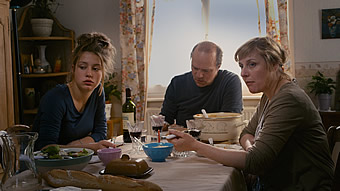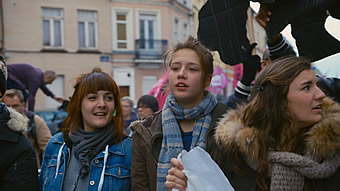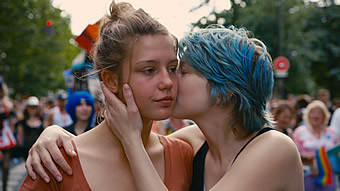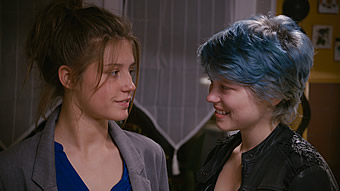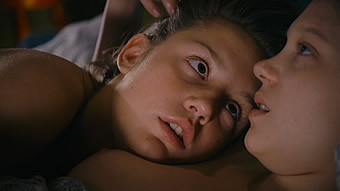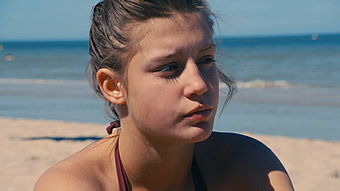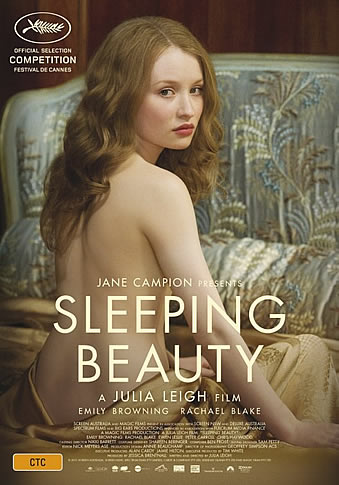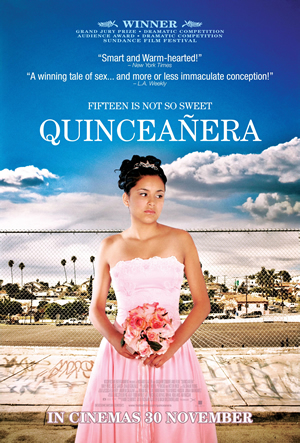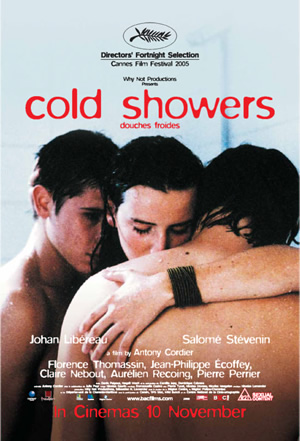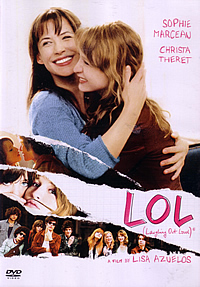BLUE IS THE WARMEST COLOR (La vie d'Adele) (2013)
Genre: Drama/Romance
Director: Abdellatif Kechiche
Cast: Léa Seydoux, Adèle Exarchopoulos, Salim Kechiouche
RunTime: 2 hrs 52 mins
Rating: R21 (Homosexual Content)
Released By: Shaw
Official Website: https://www.facebook.com/BlueIsTheWarmestColour
Opening Day: 1 May 2014
Synopsis: A 15-year-old girl named Adèle is approaching adulthood and dreams of experiencing her first love. A handsome male classmate falls for her hard, but an unsettling erotic reverie upsets the romance before it begins. Adèle imagines that the mysterious, blue-haired girl she encountered in the street slips into her bed and possesses her with an overwhelming pleasure. That blue-haired girl is a confident, older art student named Emma, who will soon enter Adèle's life for real.
Movie Review:
The French romance drama ‘Blue is the Warmest Color’ arrives on a wave of both hype and controversy- the former for being both the winner of Cannes’s top prize, the Palme d’Or, and the international critics prize at the same festival; and the latter for the explicit lesbian love-making scenes within as well as criticism focusing on the director’s indulgence and supposed predatory eye - but in order to fully appreciate the raw emotional power of this extraordinary film, we’d advise you to set aside any preconceptions you may have about it nor perhaps your own bias about homosexual relationships if any.
Tunisian-French director Abdellatif Kechiche co-adapted this story of sexual awakening and real love from a graphic novel by Julie Maroh, but he and his fellow screenwriter Ghalya Lacroix have substantially altered the story from its original source material. No matter, for say what you may about Kechiche and his methods, but there is no denying that he has crafted an extraordinarily moving film about young love. This certainly isn’t the first time that a filmmaker has tried to portray it on the big screen, but there is something truly exquisite about the way which Kechiche does it, including coaxing some of the best performances you’ll seen this year from a pair of actresses.
From death, the focus here is now on education, and those familiar with Kechiche’s work should not be surprised. Again interweaving sexuality and literature, Kechiche’s opening frame begins with an academic dissection of ‘The Life of Marianne’, Pierre Marivaux's prescient 18th-century novel on what women want, and the discussion stops aptly at the point when Marianne realises that there is something missing in her life. And that is before we meet the first of our key protagonists, Adele (Adèle Exarchopoulos), a 15-year-old high-school student on the cusp of maturity. What that means for her however is to be seen.
Pursued by the seemingly perfect guy, Adele nonetheless finds herself feeling empty and flat; instead, she can’t get out of her mind off the young woman with the blue-streaked boyish haircut whom she passed on the street. A chance meeting at a lesbian bar seals the introduction between Adele and the fourth-year fine arts student Emma (Léa Seydoux), sparking off a connection that is as intense emotionally as it develops physically. The urgency of first love, its romanticism, the physical attraction, the desperation, the ecstasy, its indelible nature even on later life, the heartbreak and the pain - Kechiche captures that with almost effortless ease, portrayed with a clarity and honesty that will transcend your personal views about sexuality, or to be more precise, homosexuality.
Given the attention it has received, it makes sense at this juncture to discuss the bedroom scenes between Adele and Emma. There’s no reconciling the divisive views on Kechiche’s extremely graphic and intimate couplings between his two key leads, but the purpose for these erotic interludes to us is always clear - sex and love are sometimes just two sides of the same coin, and in an attraction that intense and consuming, it isn’t quite possible to separate one from the other. Regardless of whether you feel that Kechiche depicts too much of the sex, the effect of watching that intimacy is undeniable, informing and enhancing the depth of their desire for each other that no words or sweet gestures can ever take the place of.
Especially so when you have such dedicated performances as that of Exarchopoulos’ and Seydoux’s - indeed, there is good reason why this is the first film ever to have the Palme d'Or awarded not just to both the director but also to its two lead actresses. Seydoux brings poise and elegance to Emma, and Exarchopoulos complements that with rawness and edge in an utterly spellbinding turn as Adele. At only 19 years old, Exarchopoulos throws herself so completely into the role to express both the ecstasy and agony of a first relationship as well as the aura and sensibility of an adult woman when her character ages into her mid-20s. Together, they are simply magnetic, and the scene where Emma confronts Adele’s infidelity is one played with such passion by both actresses that it will leave you floored.
Amid the love story, Kechiche too draws attention to the class differences between Adele and Emma. The former’s working class background is held in sharp contrast against the latter’s upper class upbringing especially in the two family dinner scenes. It is these differences that will lead to their eventual breakup, and Kechiche uses their disparate social circumstances to explain their drifting apart. More than an exploration of gender and sexual identity, Kechiche uses his film to examine issues of social belonging, backed by frequent talk about student politics, music, art history and philosophy.
And yet even if you can’t quite grasp the nuances, ‘Blue’ is still mesmerising in its emotional candour, a truly passionate and poignant exploration of love and loss. There will always be naysayers who claim that the film glamourises lesbian relationships, and those who feel that it portrays such a relationship in hetero patterns, but to get mired in that sort of criticism is simply missing the point. This is love in its truest and most elemental, a love that straight or gay we all hope to experience at some point in life, which has been translated into film with an accuracy and precision that few others have ever managed to - and that in itself is reason to make sure that you do not miss out on one of the very best films of the year.
Movie Rating:





(A tour de force in its honesty, poignancy and raw emotional power, this much-hyped portrayal of first love is a must-see no matter your sexual orientation)
Review by Gabriel Chong
You might also like:
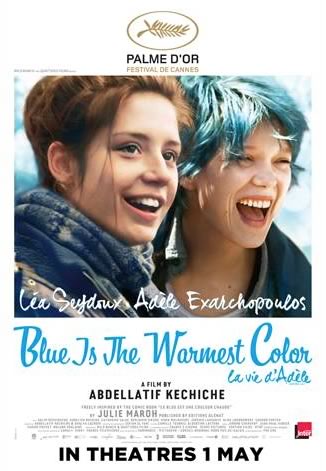
Movie Stills
